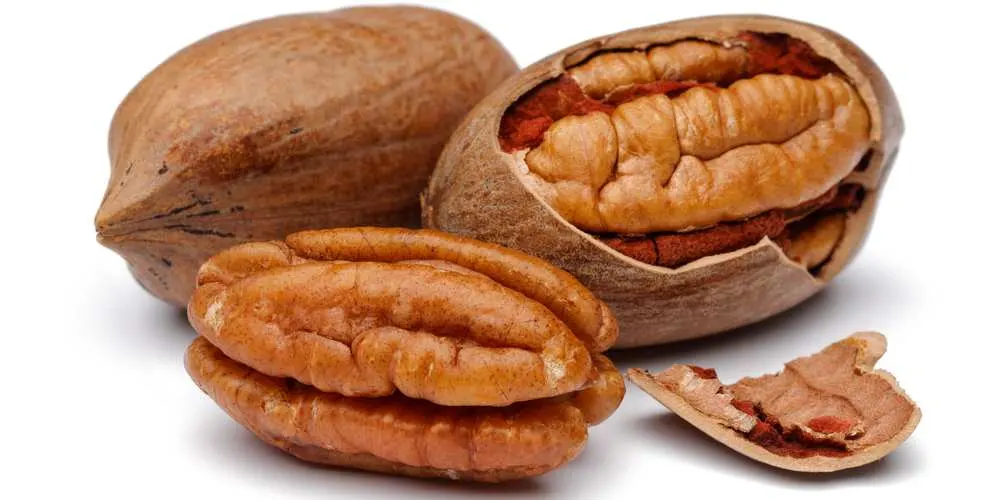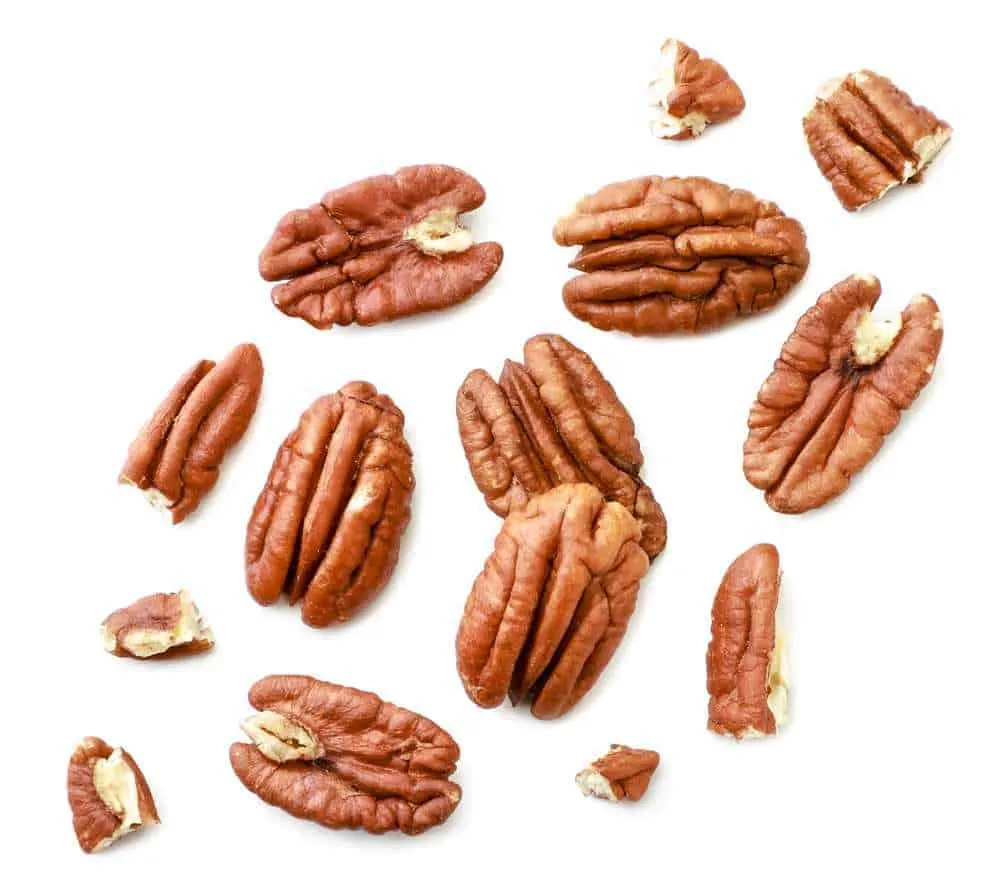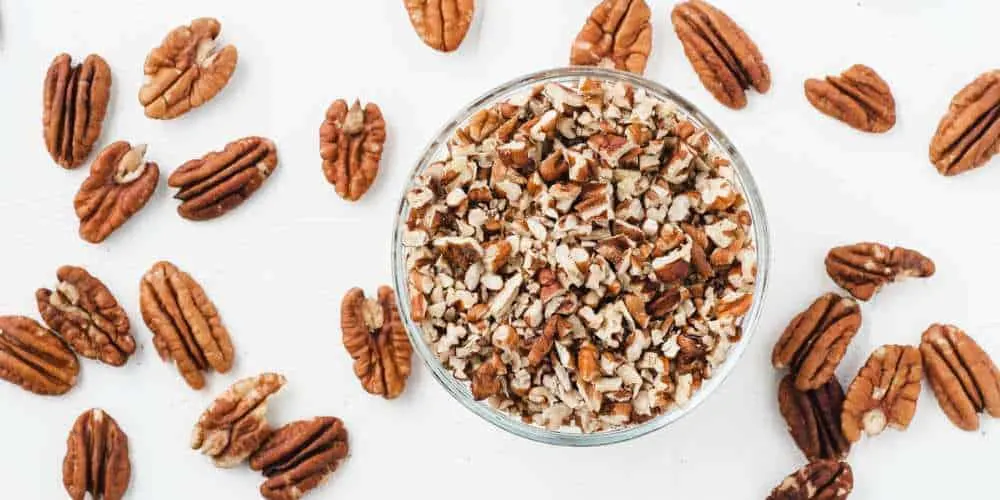Can dogs eat pecans is it one of those questions many dog owners will find themselves asking at some point in time?
Perhaps it is during Thanksgiving when your dog swiped a piece of pecan pie from a family member’s unattended plate.
Or maybe it was when you moved into that new house with the mature pecan tree in the back yard and your dog wolfed a few of them down, hulls and all before you realized what was happening.
Or it could have been when you hosted that dinner party, complete with bowls of seasonal pecan meats.
And now you are worried because your dog just ate pecans and you don’t know if that is safe or not.
We are going to answer all your questions about dogs and pecans in this article.

Should Dogs Eat Pecans?
The real question you need to get answered is not “can dogs eat pecans?” – you already know they sure can! So what you need to know – and fast – is the answer to the question of whether dogs should eat pecans or not.
The short answer to this question is “no.” Pecans are not great for dogs.
But the longer answer to this question is “not necessarily.” Pecans are not as bad for dogs as some other nuts such as macadamia nuts, which can be downright dangerous to dogs.

Are Pecans Safe For Dogs?
In the world of nuts and seeds, pecans and walnuts fall into a unique class of their own.
As the Encyclopedia of Food Sciences and Nutrition highlights, these two nuts contain a toxin called juglone. Not only does this toxin impact nearby plant life, making it hard to landscape around pecan and walnut trees, but it can affect dogs and horses when ingested.
Now, the nut meat (the tasty part) actually has the least amount of juglone. The wood, hulls, branches, roots, leaves, and buds have far more juglone than the nuts themselves.
But just the fact that all parts of the pecan tree contain some amount of juglone essentially puts these nuts on the no-no list for dogs.
Some dogs can eat pecan nuts and the trace amounts of juglone won’t bother them one bit. Other dogs may eat a tiny piece of pecan meat and have a reaction.

Are Pecans Dangerous For Dogs?
Unfortunately, the presence of the known toxin juglone is not the only thing that makes pecans less than safe for dogs to eat.
There are four other concerns about pecans that make it unwise overall to feed them to your pup.
1. Pecans Can Have Mold Or Fungus On Them
When pecans get old or when they are stored in damp or humid conditions, they can grow mold – fungus – of a type known as tremorgenic mycotoxins.
If you have ever eaten an old or soft pecan in the past, you already know that these nuts taste “off.”
But your dog might not notice (or care)….at least not until later when that mold starts causing health symptoms.
Tremorgenic mycotoxins can cause a syndrome known as “tremorgenic mycotoxin intoxication” in canines.
Today’s Veterinary Practice outlines the most common symptoms of pecan-induced tremorgenic mycotoxin intoxication:
- Muscular tremors.
- Diarrhea.
- Vomiting.
- Hyperthermia (rapid drop in body temperature).
- Seizures.
- Nystagmus (involuntary eye movement).
- Neurological dysfunction (ataxia).
- Hyperesthesia (hypersensitivity that causes pain).
2. Pecans May Contain Other “People Food” Ingredients
Pecans are very tasty, which makes them popular additions at parties and gatherings.
But pecans destined to be food for people often include other ingredients.
A common example is candied pecans and chocolate-covered pecans. Dogs should never eat candy or chocolate. Pecans may also be spiced or seasoned with garlic, onion powder, and other ingredients that are toxic to dogs.
And if pecans are sweetened with xylitol, a popular sugar alternative, they can be deadly to your dog.
3. Pecans Are Very High In Fat
Pecans, like all nuts, are also quite high in fat. This fat is what makes them so delicious, of course. But it also makes them potentially very unhealthy for your pup.
As Dr. Judy Morgan of Naturally Healthy Pets explains, the high-fat content in nuts in general and pecans specifically can cause acute pancreatitis in dogs.
Pancreatitis happens when a dog’s pancreas is overloaded with the wrong types of foods and starts to malfunction. Digestive enzymes start firing before they have reached the stomach and can even leak through to the bloodstream and start digesting everything in their path.
Fats are a huge trigger for canine pancreatitis, as PetMD points out. Some dog breeds (and some dogs) are more predisposed to canine pancreatitis than are other dogs. But avoiding excess fat is a key component of managing the disease, which often becomes chronic.
4. Pecans Can Present A Choking, Perforation, Obstruction, Or Impaction Risk
While this is more likely to happen in smaller or toy breed dogs, if a dog eats enough pecans (and especially pecans with the shells on), there will always be a potential risk of obstruction or impaction.
As well, with miniature and toy breed dogs, even a single pecan could potentially create a choking or perforation risk.
This is especially dangerous if you live in an area where many pecan trees grow naturally.
Many communities have a large number of pecan trees. When the nuts mature in the fall and begin to drop from the trees (or get gnawed off by that perpetual canine favorite – the squirrel), your dog may find them and scarf several up before you notice.
The pecan hulls have more juglone in them than do the nut meats themselves. This means ingesting hulled (shelled) pecans is more dangerous than if your dog just ate the nut meats alone.
Symptoms to watch for include the following:
- Difficulty breathing.
- Shortness of breath.
- Vomiting.
- Constipation.
- Shaking or tremors.
- Gastrointestinal pain.
- Bloating or gas.
- Whining or distress-type behavior signaling pain.
- Loss of appetite.
If you suspect your dog has eaten whole-shelled pecans and you see any of these symptoms, you should take your dog to the veterinarian or the nearest canine urgent care center right away for evaluation and treatment.

Are Pecans Healthy For Dogs?
After reading through the prior section, you probably can’t imagine that anything about pecans could be healthy for dogs.
Some dogs can eat just about anything and seem to have an “iron stomach” – nothing ever bothers them.
Other dogs may have food allergies or sensitive stomach issues and have to stay on a very strict diet.
While pecans do have some beneficial insoluble dietary fiber and a range of vitamins and minerals, there are many other, better ways to get these benefits into your dog besides feeding pecans.
The potential for choking or obstruction, digestive upset, pancreatitis, tremorgenic mycotoxin intoxication, and juglone poisoning far outweigh any possible health benefits that pecans could offer your dog.

Help! My Dog Ate Pecans!
As a dog owner, you know that your dog is smart and curious and sometimes pretends to know what the word “no” means.
Even if you take every single precaution you can think of and hide the pecans way up to where your dog cannot reach them, there is no guarantee your dog won’t find and eat a pecan someday.
What should you do if this ever happens to your precious pup?
The first thing you always need to do is to remain calm and remember what you have just read about whether dogs can eat pecans.
You know there are five main things that could happen (if anything at all happens): choking or obstruction, pancreatitis, juglone poisoning, tremorgenic mycotoxin intoxication, and digestive disturbance.
You also know the symptoms to watch for that may indicate the pecans are having an undesirable health impact on your dog.
When in doubt, always contact your dog’s veterinarian right away for an appointment. If it is after hours, always go right to the nearest available canine urgent care center for evaluation and prompt medical care. If you see any symptoms, do the same right away.
By staying aware of any pecan trees in your neighborhood, you can further guard against your dog eating pecans.
Learn More: What Can Dogs Eat? A Comprehensive List Of Dog-safe Foods

